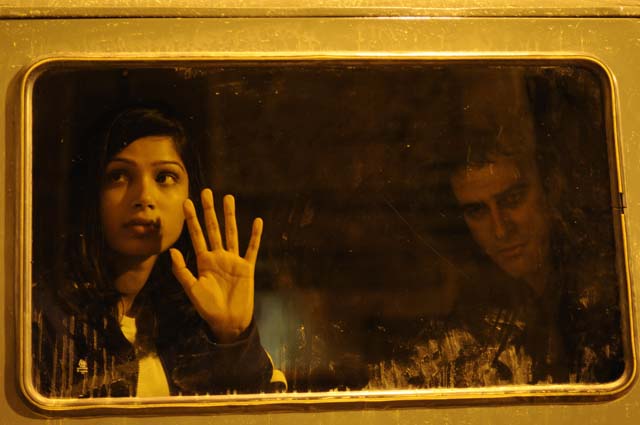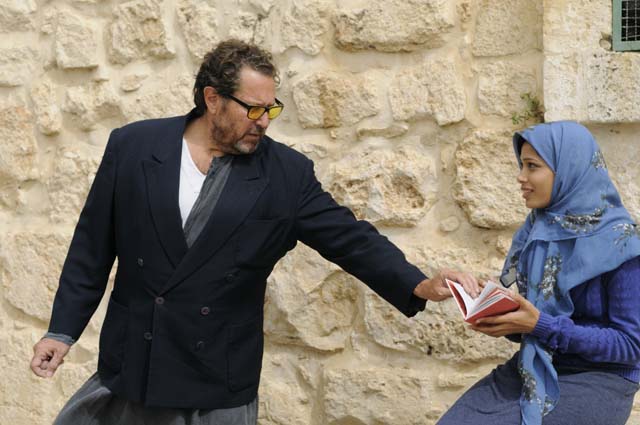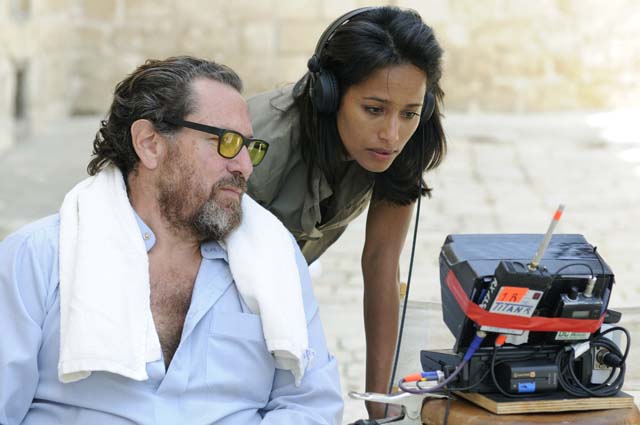
Miral – Walking in the Shoes of a Palestinian….
It is a film which touches you and makes you think and realize that there are always two sides to a story. Julian Schnabel’s ‘Miral’ was bound to cause controversy because the noted Jewish director shows the world from the perspective of a young Palestinian girl in occupied East Jerusalem, something which has rarely been done. This blistering film is based on an autobiographical book of the same name by Rula Jebreal, who grew up in the occupied territory and is now a journalist in Italy but has never forgotten the traumas of her scarred land.
.Asked about the best part of having the much admired Julian Schnabel direct ‘Miral’, Jebreal spoke of his sensibility and his humanity: “He was able to empathize and walk in the shoes of a Palestinian: her search for freedom, the search for a dignified life, her fears, and her anger. I admire how he has sought to bring a story rarely told to US audiences while humanizing the Palestinians. He is a hero in this regard.”
Schnabel himself has observed, “Before I made this film, I hardly knew anything about Palestinians. Making this film in Jerusalem allowed me to see this world for the first time, and to work with a landscape that I needed to see.” Perhaps filmgoers too will see a landscape that must be seen and the bitter harvest it has yielded.
Meet Julian Schnabel and Rula Jebreal
Both Julian Schnabel and Rula Jebreal were in New York for screenings of ‘Miral’ and have received mixed responses to the film from critics and audiences, some of whom have felt the movie is one-sided. To those critics, Schnabel has responded: “‘Miral’ was never meant to give an exhaustive, historic view of the Israeli-Palestinian conflict. Her story is not about historical events, but about what is felt within the body and the heart.”

At one of the screenings, in a Q and A. Schnabel was asked why the film was made in English. He responded, “I wanted to reach as wide a population as possible. I really don’t have a hierarchical notion of language – for me, all language sounds like music. I wanted as many people to see the film as possible – I thought it was the right language for this film.”
‘Miral’ has already been screened in the United Nations. As to whether he would be able to show the film in Israel, Schnabel said it had already been shown in Ramallah, at a theater with 400 seats, to over 500 people. “I’m sure we’ll show it in Israel some day,” he said. “I did show it to the Mayor of Jerusalem in New York and he did say he would host a screening in Jerusalem. I don’t know when that will happen. We will show the movie in Israel – I’d like as many people to see it as possible.”
Someone from the audience asked if there would be a sequel to the movie. To which Schnabel responded, “The sequel will be will be when the settlers pull out off the occupied territory. That would be a good sequel. I don’t have a sequel to make after that.” The answer provoked a few members of the audience who used some choice words and left. Many in the audience booed, and stood up for the filmmaker.
“There’s one thing that all Palestinians and all Israelis have in common and that’s that none of them have a guaranteed trip that their children are going to come home from school at the end of the day,” said Schnabel.
“Whether it’s a terrorist that’s going to blow themselves up and Israeli children are going to die or a stray bullet is going to hit a kid in the occupied territories – none of these people have the security that their family will be intact at the end of the day. It’s a hell of a way to live and I think that civil society is held hostage by fanatics on both sides.” Needless to say, there was a lot of applause. A story with two sides and both need to be told.

Q and A with Rula Jebreal
What do you hope viewers will take away from this film?
I hope viewers take away a most beautiful journey that touches their mind and heart. What is seen in the West of the Israel-Palestine situation is but the tip of the iceberg. This film delves into the actualities which will be novel for most Americans. And at the heart of this film is a 3D love story: between Miral and her father, Miral and her teacher, and Miral and her country.
What was your most memorable experience during the filming?
My most memorable experience during the filming was when we filmed at Al-Aqsa mosque. It was difficult to get permissions as foreigners aren’t typically permitted but once inside, I witnessed how Jews and Muslims came together – regardless of race, religion, and language – and worked together on this film, sharing the same love of our country.
Your thoughts on Freida Pinto as the lead in this film – what impressed you the most about her?
I was impressed by her dedication and sensibilities, especially for someone who is so early in her career. I have always believed art can transcend nationality and she reaffirmed my belief. Freida is capable, sweet and humble and she naturally fit into the role. I admire her commitment to the character and saw how hard she studied for the role. She was great as Miral.
What kind of a reaction has the movie had with audiences?
People are moved, people are happy. You know there is debate – some people agree, some people, they don’t agree but it’s about keep on talking, keeping the dialogue, debate going. The moment it shuts down, the only thing which you hear is sounds of bullets and Molotovs and bombs. Its time to break that circle of violence, it’s something that is destroying us and is compromising the future of our children and that scares me. Education saved my life, writing books gave me the possibility of bringing out the voices of many women.
Will the movie be traveling to India?
I hope it goes there because of Kashmir and Pakistan. It’s a universal story, it’s about everyone who lives in a conflict area and it’s the same dramas you see everywhere, be it Somalia or Afghanistan. This is what women are subjected to when they live in a war zone. This is what war creates, this is the psyche of a war zone, and this is imposed destiny on women.
What will you yourself always cherish about this film?
I will always cherish having the possibility of bringing this film to the Western world that has no idea what is happening in Palestine. The Palestinians are screaming for freedom and yet their screams go unheard here; they are silenced in this part of the world. I cherish being able to lift the lid of silence, even if just a little bit.

4 Comments
Hi Michele,
I did see it in NY but it was a limited run and will be opening in more theaters later, I believe.
Thanks, Sweepy Jean. You are so right though I have to admit, it’s a mix. There are many who do realize that there’s a larger world out there.
Nice article and interview, Lavina. I wish Western (American) audiences would simply try to understand other world views instead of criticizing them.
I saw Julian Schnabel on Bill Maher’s show, speaking about this movie and from then, I was intrigued. I wonder if this is playing here in NY?